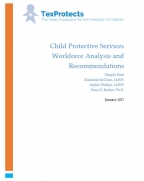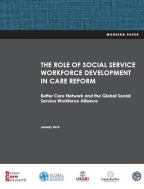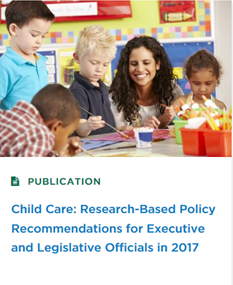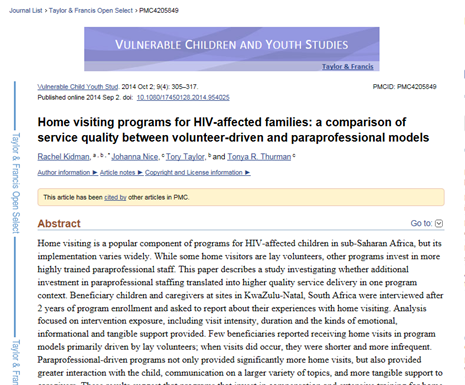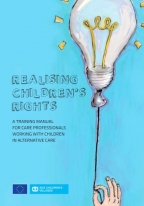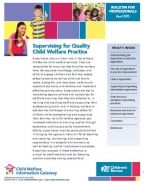Child Protection & Social Welfare
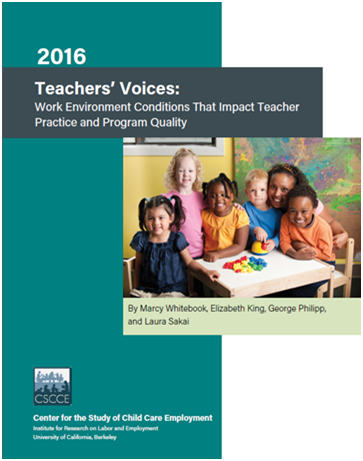
Summary:
Teachers’ Voices: Work Environment Conditions That Impact Teacher Practice and Program Quality presents the findings from the SEQUAL study focused on teaching staff. Supportive Environmental Quality Underlying Adult Learning (SEQUAL), developed by the Center for the Study of Child Care Employment (CSCCE), is used to document contextual information about workplace conditions that impact teacher practice and program quality and to build a vocabulary for the field around teachers’ needs for workplace support. The tool addresses five critical areas of teachers’ learning environments:
- Teaching supports;
- Learning opportunities;
- Policies and practices that support teaching staff’s initiative and teamwork;
- Adult well-being; and
- How supervisors and program leaders interact with staff to support their teaching practice.
In this study, assistant teachers, teachers, lead teachers and administrators employed at the 42 center-based early care and education programs reported assessments of their work environments for each of the five SEQUAL domains. This resource presents information for each of these domains, as well as recommendations for funders and policymakers.
You can find out more about SEQUAL on the CSCCE website here.
Summary:
Child Protective Services Workforce Analysis and Recommendations looks at the growing issue of child abuse in Texas and the great challenge of retaining a high-quality workforce in the state’s Child Protective Services (CPS). This documents explores trends and past reforms in the state, before addressing the issue of workforce turnover. Several issues that contribute to turnover are addressed, as well as the stages of the system.
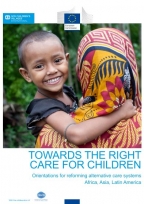
Summary:
Towards the Right Care for Children: Orientations for reforming alternative care systems - Africa, Asia, Latin America, commissioned by the European Commission Directorate General for International Cooperation and Development commissioned SOS Children’s Villages International to conduct a study on the possible issue of institutionalization in six South and Central American, Asian and African countries, in order to strengthen the knowledge of the European Commission on the nature, the extent and scope of institutionalization and feasibility of the de-institutionalization.
The objectives of this research was to:
- map and summarize the existing knowledge on (de-) institutionalization in the three continents concerned;
- increase the knowledge base on (de-) institutionalization in the six countries; and
- provide guidelines for future EU strategies on (de-)institutionalization in developing countries.
This synthesis report brings together desk reviews and country studies through which a large collection of documents from various sources have been consulted.
Summary:
The Role of Social Service Workforce Development in Care Reform illustrates key issues by drawing on the experiences of Indonesia, Moldova and Rwanda – three countries are in the process of reform. Each country's reform takes place within their own context and history, social and political system, protection structure and services, and social services education system.
The case studies highlight each country’s reform processes and identifys learning in terms of the approach taken to strengthen and align the social service workforce given the needs of the system, the scope and actors involved, and the different care reform strategies and outcomes. The case studies are presented with recognition of the ongoing and dynamic process and are examples from different stages and contexts of reform.
Summary:
Child Care: Research-Based Policy Recommendations for Executive and Legislative Officials in 2017 presents the following set of reccomenations:
- Use regional market rate survey data to inform a tax credit formula that will provide a true benefit to families.
- Support a highly effective child care workforce with scholarships for training and education.
- Use caution when amending child care regulations, specifically child-teacher ratios and group size requirements.
This short policy brief was released by Child Trends.
Summary:
Home visiting programs for HIV-affected families: a comparison of service quality between volunteer-driven and paraprofessional models investigated whether or not additional investment in paraprofessional staff translated into higher quality service delivery. The study, conducted in KwaZulu-Natal, South Africa was conducted over a two-year span. The results suggested that compensation and extensive training programs for home visitors are better able to serve and retain beneficiaries than volunteer home visiting programs.
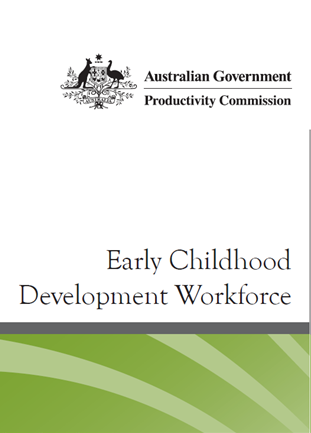
Summary:
The early childhood development sector plays an important role in fostering the education, health and care of young children. Early childhood education and care services are currently the subject of significant reforms nationally. These reforms have substantial implications for the associated workforce. This report, the second of three on education and training workforces, focuses on the early childhood development workforce. It follows the Vocational Education and Training workforce report released in May 2011. The third report, on the Schools workforce, is underway and will be completed in April next year.
The Commission’s recommendations and findings seek to support the future development of the early childhood workforce required to underpin the nationally agreed reforms. In particular, guidance is provided on the provision of quality early childhood education and care services to children with additional needs, Aboriginal and Torres Strait Islander children and children in rural and remote locations.

Summary:
This end of project evaluation examined how well Children First (CF) had responded to Mid Term Review recommendations as well as evaluation questions regarding innovative, sustainable and effective models of service delivery; quantity, quality and timeliness of results; capacity development for partners and communities; and institutionalization of models within relevant government structures.
CF sought to mitigate the impact of HIV and AIDS in Zimbabwe by developing and improving on effective models of care and support for OVC and leveraging the experience of national and community-based organizations to increase access to quality holistic services for OVC. CF sought to mitigate the impact of HIV and AIDS in Zimbabwe by developing and improving on effective models of care and support for OVC and leveraging the experience of national and community-based organizations to increase access to quality holistic services for OVC. Over the five-year project period, CF included 22 partner organizations that provided education, health, child protection services and advocacy for OVC.
Summary:
SOS Children’s Villages has been working to embed children’s rights within care settings for many years. Our approach has been multifaceted, embracing structures and institutions, care professionals and young people themselves. One gap identified in the course of this work has been the absence of effective training programmes for care professionals which have children’s rights at the core. This manual has been produced to fill that gap. The two-day course outlined in these pages is designed to familiarise groups of care professionals with the international standards and principles surrounding children’s rights – and above all, to relate this to the daily experience and challenges arising in the field of alternative care. The course is intended to provide participants with the information, motivation and strategies that they can use to carry children’s rights into their daily work. The aim is to contribute to higher quality care and a culture of respect for children’s rights.
Summary:
This bulletin for professionals presents an overview of child welfare supervision and explores the dimensions of supervision that agencies may want to consider as they seek to strengthen the effectiveness of their services to children and families. This bulletin is designed to provide child welfare supervisors, managers, and related professionals with examples of States’ efforts to strengthen supervisory capacity and with tools and resources to enhance supervisory skills.



